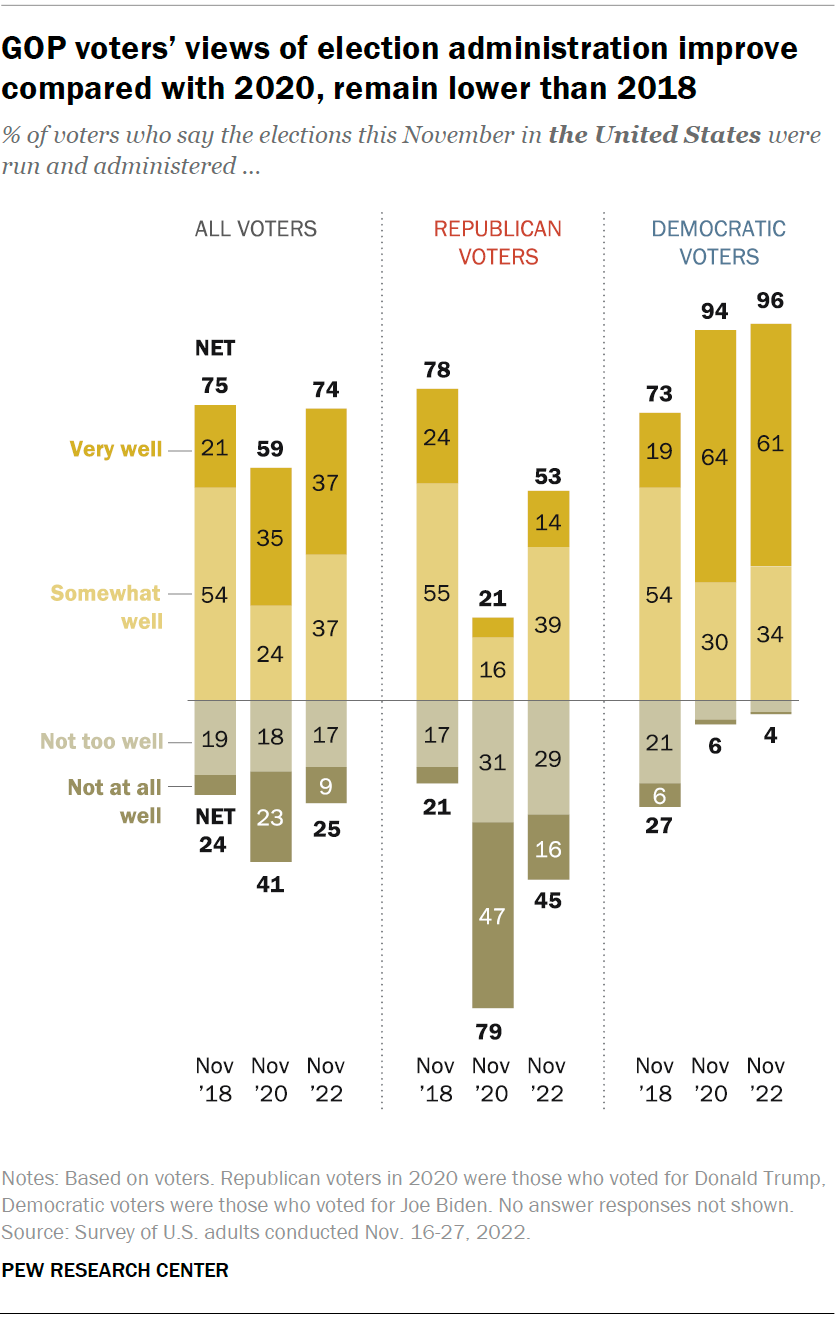A Reasonable Take on The Twitter Files - #BCB 29
Also: OpenAI's ChatGPT is apparently Blue, anti-anti-racism vs. racism, Red has become more trusting of elections
Two non-crazy responses to The Twitter Files
In a nutshell, everyone lost their freakin’ minds over the Twitter Files. While the power of platforms to shape speech is one of the great polarizing issues of our time, we haven’t covered this material — which details the circumstances of previous politically-loaded content moderation decisions — because we’ve been waiting for a reasonable take. We’ve found two.
Tangle’s Issaac Saul examines how the disclosures around the Hunter Biden laptop story are being interpreted. Red feels that there were double-standards in Twitter moderation leading up to the election, with some commentators claiming that the censored information could have been consequential enough to change the results in 2020, and some (but not all) calling it a First Amendment violation. As expected, Blue commentators minimize the severity of what the Files actually reveal, which may not be as scandalous as Red might have hoped. The Biden campaign did request to remove some tweets, but those were nude pictures of Hunter Biden which violated Twitter policies anyway. Anyway, Trump was in the White House at that point, so it wasn't quite government censorship.
The Atlantic’s Conor Friedersdorf tackles the response to Musk’s Twitter takeover in general, noting how hysterical and uncritical much of the coverage has been, despite the seriousness of the issues at stake. “If Musk is prone to grandiosity, flippancy, and free-speech claims that run the gamut from incisive to oversimplified to flagrantly promoting a mercenary agenda, his critics are as prone to Manichean portrayals that tend toward panicked, catastrophizing hyperbole.”
OpenAI’s ChatGPT is apparently Blue
On November 30th, OpenAI released one of the most advanced conversational bots ever created, ChatGPT. Users can type in a question or task, and the software response will mimic a human; it can even do poetry and journal articles.
Much has been said about the potential racial and gender biases of large AI models. In a strange Twist, David Rozado asked ChatGPT to answer four political orientation tests, including the The Pew Research Political Typology Quiz (probably a lot more rigorously designed than the others, as it’s based on a clustering analysis of political attitudes – see BCB #11). ChatGPT scored Left-Libertarian (twice), Establishment Liberal, and Progressive.
Excerpt of results from the Political Spectrum Quiz
For now, it’s not really clear what this means. The AI has been trained by gathering billions of texts all over the Internet including from academia, literature, news and social media, and it’s been tuned by OpenAI to not be offensive, which probably pushes it in a more social-justice-y Blue direction. However, the potential political biases of AI systems will become an increasingly important dimension of future political conflicts.
Anti-anti-racism vs. racism
This new study develops the concept of “anti-anti-racist” attitudes, and shows that they are a major new factor in American politics. Anti-anti-racism is a widespread Red ideology and a powerful indicator of support for Trump, even more predictive than racial, ideological and socioeconomic factors. Yet it seems to measure something different than traditional measures of racism:
While over half of whites tended to agree with statements expressing anti-anti racism (50.9%), a significantly lower number agreed with statements expressing racial resentment (42.6%), negative racial stereotypes (27.3%), or explicit racial prejudice (7.3%). This shows statements reflecting opposition to antiracism are explicitly endorsed at significantly higher levels than statements reflecting other racial attitudes.
Another interesting finding is that when whites who are high in anti-anti-racism are exposed to authoritative data on racial hiring bias, they update their beliefs on the severity of anti-Black discrimination.
This is encouraging, because it shows a distinction between objecting to anti-racism rhetoric and, well, actual racism; the former seems to be a more shallow, socially-cued attitude that is open to learning. We also find these results notable because we think it’s important to preserve ideological space for legitimate criticism of responses to racism; otherwise no real conversation is possible.
Red perception of clean elections is up by 30 points
Last but not least, some good news. Pew’s latest study of perceptions of the 2022 midterm and the voting process shows that there is still a wide partisan gap between Red and Blue in their perception of clean elections — but that gap is closing. 53% of Reds said the 2022 election was “run and administered well,” while only 21% said this after the 2020 election. It’s hard to say for certain yet, but it now looks like the massive distrust of 2020 was more likely an outlier than a trend.
Quote of the Week
Both parties had access to these tools. For instance, in 2020, requests from both the Trump White House and the Biden campaign were received and honored. However, this system wasn't balanced. It was based on contacts. Because Twitter was and is overwhelmingly staffed by people of one political orientation, there were more channels, more ways to complain, open to the left (well, Democrats) than the right.



